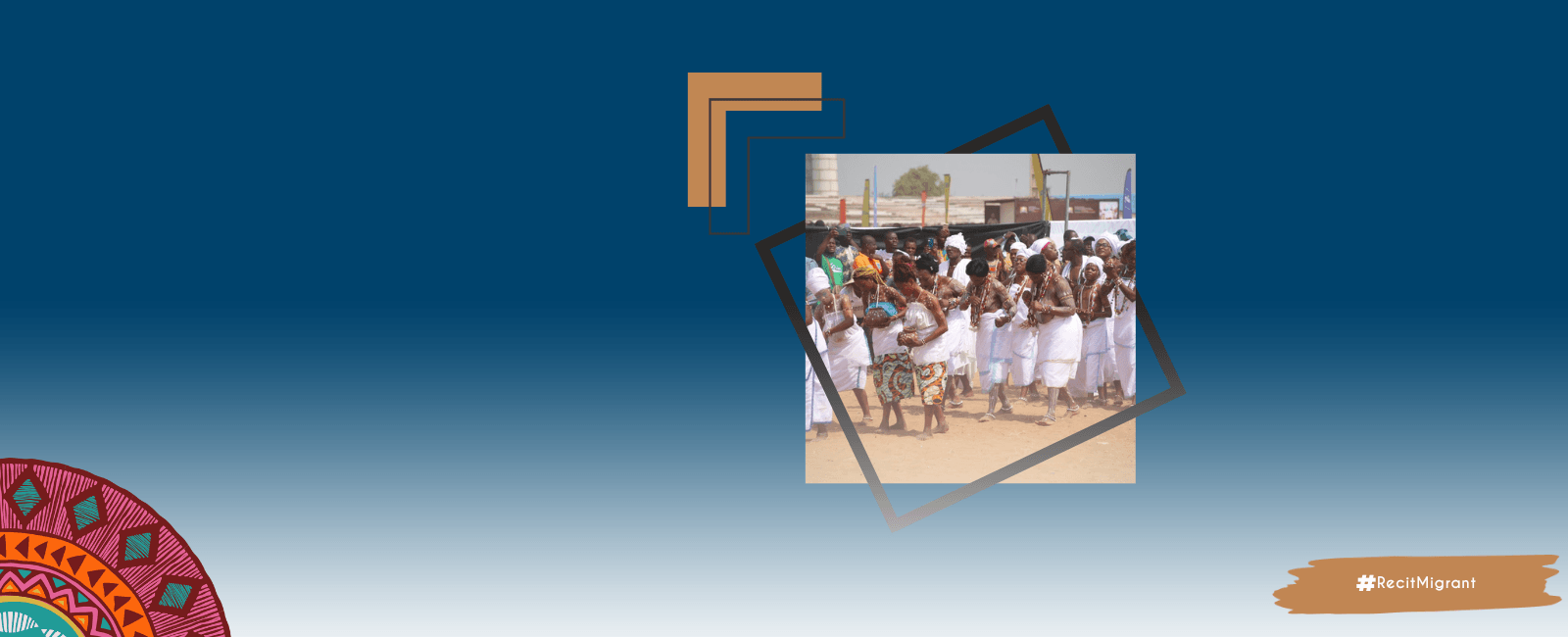

Benin is known worldwide as the land of Vodun. Since 1993, the country has celebrated the Vodun Festival each year on January 10. Beginning in 2024, the celebration was expanded into a multi-day event called Vodun Days. Benin’s global reputation in this regard has not developed by chance, rather, it is the result of a powerful cultural phenomenon.
Vodun culture encompasses a multitude of deities and a wide array of rituals. On this Sunday morning in April 2025, in a suburb of Cotonou, barefoot practitioners dressed in white and adorned with pearls dance to the rhythm of drums and a chorus of chants. We are in a monastery dedicated to the deity Tron.
The Tron cult, practiced in Benin, was brought from Ghana via Togo at the turn of the century. Although the historical details of its origins and migration remain somewhat vague, there is general agreement that the cult is of Ghanaian and Hausa origin, influenced by Islam. As researcher Emmanuelle Kadya Tall notes in her article “Thérapeutique islamique et vodouiste: points de rencontre” (Islamic and Vodun Healing Practices: Meeting Points) “everyone agrees that it is of Ghanaian and Hausa origin, with an Islamic influence.” She also observes that “most of the sect leaders interviewed pay homage to the major popular Vodun deities such as Sakpata, Xevioso and Dan.”
Intra-African migration
The term ‘voodoo’ derives from the Fon word vodun, meaning “spirit” or “deity.” These deities can take the form of animals, supernatural forces or deified ancestors.
Vodun traces its roots to the 18th century in Ouidah, a former slave-trading port on the coast of what is now Benin. At the time, Ouidah was a major commercial hub within the Kingdom of Danxomè, which included several cities in southern Benin. As a cultural crossroads where traditions from the Yoruba and Ashanti kingdoms converged, Ouidah provided fertile ground for the development of Vodun in its present form.
Vodun quickly became a central religious practice in Danxomè. Priests and priestesses who were considered as high-ranking religious dignitaries, played a vital role in society. They were responsible for maintaining harmony with the spirits and safeguarding the kingdom’s prosperity.
The introduction of Fa or Ifa in present-day Benin
According to elders and esteemed bokonons (diviners), Fa – also known as Ifa – is the most recent of all deities and spiritual systems within Vodun culture. An essential and “inescapable” component of Vodun, the Ifa divination system was recognised in 2005 by UNESCO as a Masterpiece of the Oral and Intangible Heritage of Humanity. The city of Ifè, located in present-day Nigeria, remains the spiritual epicenter of Ifa for practitioners across the region.
Originating among the Yoruba peoples of West Africa, the Ifa oracle made its way into present-day Benin from Nigeria around the 17th century. Initially practiced unofficially in the Kingdom of Danxomè – one of the most powerful kingdoms in southern Benin – Ifa gradually gained recognition as a respected method of divination and decision-making.
A well-known historical anecdote recounts how this practice was eventually embraced by the royal court of Abomey, the political and spiritual heart of the Danxomè kingdom.
A close link between population movement and settlement
In this village in central Benin, home to hundreds of Vodun, it is forbidden to keep pigs, for fear that they might unearth sacred objects or disturb the resting places of deities. One of the village elders explains that while some Vodun originated in this very location, others were brought from elsewhere.
A member of a community responsible for overseeing deities from a neighbouring village recounts how their ancestors, upon settling here, brought their Vodun with them to ensure protection and prosperity in their new home.
In northern Benin, the Bariba are one of the most prominent ethnic groups. Ouénou, a central locality within the vast Bariba kingdom of Nikki, lies at the heart of this cultural heritage. The kingdom is believed to have been founded between the 15th and 16th centuries. According to oral tradition, the Wassangari (Bariba) trace their origins to ancient Persia. After leaving Busa – the land of the Boko people in present-day Nigeria – they eventually settled permanently in Ouénou.
Their ancestor, known variously as Kisra-Kissira-Kissia, is said to have been a pagan emperor of Persia (modern-day Iran) who was expelled along with his followers pursuant to the rise of Islam. Each year, the Bariba people honour this legacy during the Gaani festival, a vibrant celebration marked by rituals and traditions.
Meanwhile, the practice of Vodun, though known by different names and shaped by diverse cultural influences, remains deeply rooted across present-day Benin. The memory of legendary figures who resisted colonial conquest continues to be preserved through oral history and spiritual traditions.
Migration across the Atlantic
In his 1992 book, titled “Cultures vodoun: manifestations, migrations, métamorphoses : Afrique, Caraïbes, Amériques” (“Vodoun Cultures: Manifestations, Migrations, Metamorphoses: Africa, Caribbean, Americas.”) Beninese sociologist Honorat Aguessy – founder of the Institute for Endogenous Development and Exchanges (Institut de Développement et d’Échanges Endogènes (IDEE) – explored how Vodun spread from Africa to other continents.
During the transatlantic slave trade, Vodun was carried across the ocean by enslaved Africans to the Americas.
In their new, often hostile environments, practitioners continued their worship in secrecy to avoid persecution by colonial authorities. This oppressive context compelled Vodun to evolve, absorbing elements of other religions and cultural systems. As a result, new syncretic forms of Vodun emerged, blending African spiritual practices with aspects of Christianity, Hinduism and Islam. These transformations gave rise to the unique expressions of Vodun seen today in Haiti, Louisiana and the West Indies.
Vodun has merged with other belief systems and has had a profound influence on various cultures throughout the Americas. This legacy is especially evident in syncretic practices such as Santería in Cuba, Voodoo in Haiti and Candomblé in Brazil.
On July 30, 2024, the National Assembly of Benin passed a bill officially establishing an annual celebration of traditional religions in the Republic of Benin. According to the law, this celebration will take place every year on the second Friday of January. Consequently, both the preceding Thursday and Friday are now recognised as paid public holidays, collectively known as Vodun Days.
This cultural and religious event attracts tourists and Vodun followers from all over the world to Benin.
Recently Published
Subscribe to our newsletter!
Quick Links


